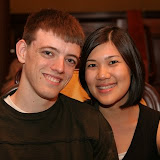I should probably try to clarify some of my remarks from a couple posts ago. I had a friend IM me (and yes, Sachin, of course I remember you!) and point out that atheists or agnostics can live moral lives as well as any Christian. This would seem to defeat my point that moral decisions for them are infinite, so choosing a path is infinitely simple.
I acknowledge that Christians don’t have a corner on the morality market. I also acknowledge that not believing in God doesn’t necessarily give you a feeling of freedom from obligation or things you “must” do. However, I would argue that that feeling is primarily a result of religious belief. Our entire structure of law, obligation, morality, and responsibility is built on precepts that were born of religious principles. For instance, why do we have welfare? What reason is there for helping the poor?
Well, for one thing, we tend to have “sympathy pains” for them when we are made aware of their need. This is why commercials for international aid organizations always say, “Don’t just turn off the TV”, because they know they need to play to your sympathies. Humans naturally dislike pain, even sympathy pain, so they respond in one of two ways. Either they try to ignore the pain or they try to dispel it. Ignoring is turning off the TV or, even better, being able to desensitize and overcome feelings of guilt and sympathy. Dispelling, on the other hand, is doing things to help those who have the pain.
The principle of dealing with the pain of others by helping to dispel it is inherently religious. It assumes the dignity and worth of all people, and places a value on giving, sacrifice, and compassion. Today’s atheism, for the most part, is still infused with those types of principles, causing many atheists to have a morality that makes no sense given their worldview.
Nietzsche was great for this. He pointed out that our entire governmental and societal structure is built on religious assumptions. If we are to truly show our commitment to a scientific world devoid of the supernatural, he argued, we must reshape our entire understanding of right and wrong to fit our new understanding of the order of the universe. Rather than look to the heavens for help and guidance, we must embrace and celebrate our mortality and the futility of our existence, and through that embracing reach higher states of evolution than were ever thought possible (this race being the overmen, or supermen).
Again, this shouldn’t be taken as a criticism of the value or worth of my atheist or agnostic friends. Their love and compassion is very real, as is the quality of their character. Most of my friends in high school were non-religious, and it certainly wasn’t because I had some masochistic desire to spend time with people who wouldn’t care about me. In reality, I spent time with them because they were extremely loving and accepting towards me and my many quirks.
The reason I pointed this topic out in the first place is actually to express a certain sort of jealousy. I WISH I could choose my own morality, my own purpose, my own direction. It must be nice. I wish I could forge the kind of existence and relationships that would alter the way the world thinks. I wish I could avoid identification with a particular group and create my own way of thinking.
But I can’t. I am completely convinced of God as Truth and the Bible as His Word. There can be no turning back.
4/13/2005
Subscribe to:
Post Comments (Atom)

No comments:
Post a Comment